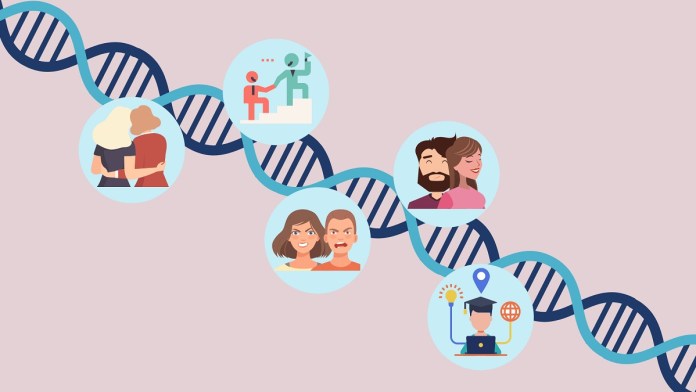Many estimates of how strongly traits and diseases share genetic signals may be inflated, according to a new UCLA-led study that indicates current methods for assessing genetic relationships between traits fail to account for mating patterns. Through the use of powerful genome sequencing technology, scientists in recent years have sought to understand the genetic associations between traits and disease risk, hoping that discoveries of shared genetics could point to clues for tackling diseases.
However, UCLA researchers said that their new study, published on 17 November in Science, provides caution against relying too heavily on genetic correlation estimates. They say that such estimates are confounded by non-biological factors more than has been previously appreciated.
Why people draw genetic conclusions upon observing human traits; how they are wrong
Genetic correlation estimates typically assume that mating is random. But in the real world, partners tend to pair up because of many shared interests and social structures. As a result, some genetic correlations in previous work that have been attributed to shared biology may instead represent incorrect statistical assumptions. For example, previous estimates of genetic overlap between body mass index (BMI) and educational attainment are likely to reflect this type of population structure, induced by “cross-trait assortative mating,” or how individuals of one trait tend to partner with individuals of another trait.
The study authors said genetic correlation estimates deserved more scrutiny since these estimates had been used to predict disease risk, glean clues for potential therapies, inform diagnostic practices and shape arguments about human behaviour and societal issues. The authors said some in the scientific community had placed too much emphasis on genetic correlation estimates based on the idea that studying genes, because they are unalterable, can overcome confounding factors.
“If you just look at two traits that are elevated in a group of people, you can’t conclude that they’re there for the same reason,” said lead author Richard Border, a postdoctoral researcher in statistical genetics at UCLA. “But there’s been a kind of assumption that if you can track this back to genes, then you would have the causal story.”
Based on their analysis of two large databases of spousal traits, researchers found that cross-trait assortative mating is strongly associated with genetic correlation estimates and plausibly accounts for a “substantial” portion of genetic correlation estimates.
“Cross-trait assortative mating has affected all of our genomes and caused interesting correlations between DNA you inherit from your mother and DNA you inherit from your father across the whole genome,” said study co-author Noah Zaitlen, a professor of computational medicine and neurology at UCLA Health.
Controversy
The researchers also examined genetic correlation estimates of psychiatric disorders, which have sparked debate in the psychiatric community because they appear to show genetic relationships among disorders that seemingly have little similarities, such as attention-deficit hyperactivity disorder and schizophrenia. The researchers found that genetic correlations for a number of unrelated traits could be plausibly attributed to cross-trait assortative mating and imperfect diagnostic practices. On the other hand, their analysis found stronger links for some pairs of traits, like anxiety disorders and major depression, suggesting that there truly is at least some shared biology.
“But even when there is a real signal there, we’re still suggesting that we’re overestimating the extent of that sharing,” Border said.
Other study authors include Georgios Athanasiadis, Alfonso Buil, Andrew J Schork, Na Cai, Alexander I Young, Thomas Werge, Jonathan Flint, Kenneth S Kendler, Sriram Sankararaman and Andy Dahl. The authors declared no competing interests.
Story Source:
Materials provided by the University of California - Los Angeles Health Sciences. Note: Content may be edited for style and length.
Journal Reference:
- Richard Border, Georgios Athanasiadis, Alfonso Buil, Andrew J. Schork, Na Cai, Alexander I. Young, Thomas Werge, Jonathan Flint, Kenneth S. Kendler, Sriram Sankararaman, Andy W. Dahl, Noah A. Zaitlen. Cross-trait assortative mating is widespread and inflates genetic correlation estimates. Science, 2022; 378 (6621): 754 DOI.




You must log in to post a comment.